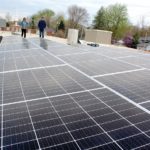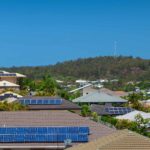ROTTERDAM — Lawmakers on Friday approved a $27.7 million spending plan for the 2023 fiscal year that would keep property taxes flat and reduce water and sewer rates during a special Town Board meeting, where legislation was introduced to implement a yearlong moratorium on large-scale solar arrays.
The Town Board approved the 2023 budget in a 3-0 vote, capping off a weekslong process that began in October, when a tentative spending plan was first introduced. Board members Samantha Miller-Herrera and Joseph Mastroianni were not in attendance.
The approved spending plan reduces town spending by 1% and, for the first time in years, keeps property taxes flat for homeowners and commercial property owners, while reducing water and sewer rates across the board. The approximate $12.5 million tax levy would be divided between the town’s general and highway fund.
Homeowners, under the spending plan, will pay $4.25 per $1,000 of assessed property value, while commercial property owners will pay $8.26 per $1,000 of assessed value next year.
“We really were concerned about the residents and we wanted to keep it flat this year because of inflation,” said Supervisor Mollie Collins. “I’m very happy.”
The budget includes just under $500,000 in fund balance to balance the $18 million general budget, and $406,000, to balance the $4.7 million highway budget.
Also appropriated is $136,817 in fund balance for Sewer District No. 2 and $13,000 for Sewer District No. 5. Fund balance was also used in Water Districts No. 3 ($79,543), 4 ($1,000) and 5 ($239,901) as a way of reducing rates.
Sales tax revenue under the spending plan is projected to increase to $3.7 million, up $102,611 from the current budget, or a 2.8% increase.
Police spending is set to increase by $113,903, or 1.7%, to $6.6 million next year, and includes a more than $12,000 pay increase for the police chief and $8,000 raise for the deputy chief, bring the salaries for each position to $171,934 and $147,525, respectively.
Also included in the budget is $243,750 in fund balance to settle a legal dispute with the owners of ViaPort over a canceled lease agreement that would have moved town offices to the shopping mall.
The 10-year lease agreement was approved last year by the previous Town Board, which also voted to pay a $1 million security deposit using federal coronavirus-relief dollars the town received as part of the American Rescue Plan Act.
But a newly seated slate of lawmakers voted to nullify the agreement because of a procedural error laid out in state law requiring the town to advertise a permissive referendum for the deal — a step that was not taken.
The $243,750 payment to ViaPort absolves the town from any further legal action and is just a fraction of the more than $3 million the town would have been liable for under the canceled lease.
Lawmakers also took the first step in settling another issue in town that has rankled residents in recent weeks by introducing legislation to adopt a 12-month moratorium on “solar farms and solar power plants” in a 3-0 vote.
Board member Evan Christou, who pushed for the legislation earlier this month, said the moratorium has nothing to do with prohibiting clean forms of energy production, but ensuring that the town’s code is up to date and the town is addressing all concerns raised by residents moving forward.
“We have to make sure we are prudent and responsible,” Christou said, noting that he normally does not support moratoriums.
The legislation comes months after East Light Partners of Massachusetts introduced plans to construct a 20-megawatt solar array on an undeveloped plot of land along Sandborn Road that would require clearcutting 150 acres of land. The company has built a number of large arrays throughout the state, including those found in Saratoga and Columbia counties.
Residents who live in the area, earlier this month, urged lawmakers to adopt the moratorium in order to update zoning laws on solar in place since 2017 to reflect a draft comprehensive plan that calls for preserving “key natural resources and critical environmental areas,” which lawmakers are expected to officially adopt in the coming weeks.
The comprehensive plan was last updated more than 20 years ago, in 2001.
A representative from East Light Partners, Jamie Fordyce, said the company has worked with town planning and engineering officials to address concerns and are willing to continue having a productive dialogue to address concerns about the project.
He added that the current zoning law regarding solar already addresses many concerns raised by residents, and that solar energy does fit into the town’s proposed comprehensive plan.
“We believe the development of solar is consistent with the plan,” Fordyce said.
Current law allows solar arrays to be constructed in the town’s agricultural, light and heavy industrial zoning districts with a special use permit, and requires land clearing be limited to 30% of the property and 100-foot buffers.
A public hearing on the proposed moratorium will take place Dec. 14.
If the moratorium is approved, Rotterdam would be the latest municipality in the region to adopt such legislation, following in the footsteps of Duanesburg, Canajoharie, Glen and Root.
Contact reporter Chad Arnold at: [email protected] Follow him on Twitter: @ChadGArnold.
More from The Daily Gazette:
Categories: Email Newsletter, News, News, Rotterdam, Schenectady County





















Recent Comments